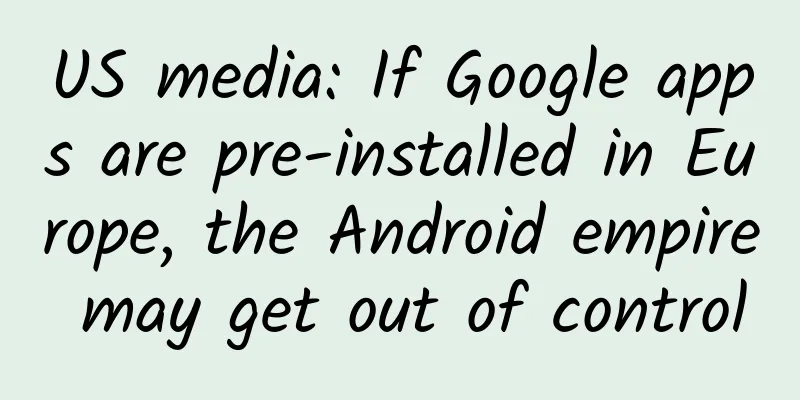US media: If Google apps are pre-installed in Europe, the Android empire may get out of control

|
On October 22, Wired wrote that Google has agreed to make changes to the Android operating system to avoid a $3.8 billion antitrust fine from the European Union. In addition to allowing customization of the Android operating system, the company will also charge licensing fees to device manufacturers that use its apps and Play Store. *** reported that most Android manufacturers may have to pay around $20 per device, with some paying up to $40. There are also rumors that companies that choose to install the Chrome web browser and Google search engine on their devices will pay some or all of the licensing fees. Media commentary said the changes could radically alter the operating system and that Google risks losing control of its empire. The following is the main content of the article: The European Union appears to have won. In response to a massive multi-billion-euro fine for anti-competitive behavior on Android, Google has agreed to change the way its Android operating system works. Hiroshi Lockheimer, Google's senior vice president of platforms and ecosystems, announced an overhaul of Android that could have long-term implications for Android's dominance of the overall smartphone market and the prices we pay for our phones. Google’s concession comes a week before it must comply with a European Commission ruling that it imposed “unlawful restrictions” on use of its Android operating system, following a separate appeal earlier this month and changes that address many of the commission’s concerns. The changes will take effect on October 29, the deadline by which Google had to make the changes. Analysts believe that Google has done enough to get out of the way of the technocrats (for now). Geoff Blaber, an analyst at market research firm CCS Insight, pointed out that "Google has addressed the main demands of the Europeans while maintaining Android's open source model." But the longer-term danger could come from Google losing control over how and where Android is distributed. "That opens the door to more competition and could make it harder to control Android fragmentation," Blaber said. So what has Google done? So far, it has only extended access to the Play Store to devices using the standard, non-customized version of Android. Want to run a modified version of Google's operating system on your smartphone? In the past, doing so risked losing access to the 2.5 million apps on the Play Store. Google has an effective veto over whether phone manufacturers can install the Android operating system on their phones. Manufacturers are required to sign a mobile application distribution agreement (such as the agreement between Google and Samsung) and an anti-fragmentation agreement, the latter of which prohibits manufacturers from modifying the Android operating system to create customized versions. Now Google has announced that it will allow customized versions, although it will still install its apps on devices that use customized versions of the system. The company's aggressive move allowed it to avoid a €4.34 billion (about $3.8 billion, or two weeks' worth of Google revenue) fine from the European Union, but it could do more harm in the long run. Note that I said "might." In addition to allowing customization of the Android operating system, Google has also made significant changes to its Android business model. For years, Google has effectively subsidized the billions of dollars in costs of developing Android, an open source operating system, by pre-installing Google Chrome and its search app. "Historically, Android has been a way for Google to ensure that its application services can be distributed at the lowest cost," explained mobile industry analyst Horace Dediu. Google has been able to cover its development costs and potentially turn a profit by directing the 88% of smartphone users worldwide who run Android on their phones to its own web browser and search engine (which displays its own ads). But as the company made clear in its statement that it would comply with the European Commission's rules, some things are about to change. Device manufacturers can still customize their smartphones with a version of Android, but now, in Europe, to get the Play Store, millions of apps, and Google's own apps, they must pay Google a new paid licensing agreement for smartphones and tablets (most Android manufacturers may have to pay around $20 per device, and up to $40, according to Reuters), allowing the latter to make up for the lost advertising revenue. This is a big deal. In the years that Google’s apps have come pre-installed on Android, consumers have become accustomed to using them. Across Europe, 90% to 100% of mobile searches are conducted through Google, with every country in that range. Chrome has grown its share of the mobile browser market tenfold since October 2013 and is now the dominant browser everywhere, with around 55% penetration. Google's ubiquitous reach isn't limited to search. In the future, will you want Gmail, YouTube, or Google Maps on your phone? Manufacturers will have to pay to get those apps. Changing app habits is difficult for many of us, especially search, so phone manufacturers may calculate that paying Google to pre-install those services will eventually be worth it. If you could simply increase the price of a phone and pass any additional costs on to consumers, the decision would be a no-brainer. Details about Google's licensing plan are sketchy, including how much it will charge manufacturers, so it's impossible to tell whether the decision will have a substantive impact on the giant. However, Blaber sees a big loser: everyone else. "As we noted at the time of the [original] ruling, the EU decision risks penalizing consumers by making devices more expensive," he said.
However, it's also possible that things could go the other way: Although Google has made it clear that it will charge OEMs for using its apps, Dediu said Google could end up having to pay to be the default search engine on devices. "On iOS, Google pays Apple a pretty penny to be the default search engine on Safari. Rumors are now that the fee is in the $9 billion range," he noted. "If you're an OEM, like Samsung, you don't have to make Google Search the default search engine anymore - and you probably do - but if you don't have to, you might ask Google to pay, even if you're providing the search engine on Android. They could threaten to invite Microsoft's Bing to join, which isn't a credible threat, but it would give OEMs more leverage in negotiations with Google." Google faces other risks as well. It’s hard not to draw parallels with another major European antitrust ruling against a dominant tech giant that bundled its own apps into its operating system. Nearly a decade ago, Microsoft was forced to display a “browser choice screen” the first time a user opens Internet Explorer, alerting users to competing products, after third-party web browsers complained to regulators. At the time, Internet Explorer was the most popular browser, accounting for half of the market, while Opera's market share was only 2%. Today, Opera has grown dramatically—reaching a staggering 33% of Internet users. Internet Explorer (now Microsoft Edge) has plummeted, now accounting for just 6% of the market. But the real beneficiary of having more browsers to choose from is someone else. A tiny browser that had a 7.5% market share in March 2010 now has 62% of the market. Who is it? Google Chrome. There is precedent. Simoninetta Vezzoso, a law professor at the University of Trento, pointed out in a paper last week that Google reached a similar agreement with Russia's antitrust authorities in 2017. It had to remove restrictions on pre-installing competing search engines on Android phones, and it had to introduce a browser selection interface. The interface was launched in August last year. By the end of the next month, Google's search engine share on Android devices had fallen by a full 3 percentage points. In Europe, Google has clearly not backed down from offering a browser choice interface, but it remains to be seen whether its other decisions, taken together, will affect its dominance in the smartphone market. |
<<: How to design mobile search? The answer lies in these four parts I summarized
Recommend
Nielsen: 2022 Chinese Women's Auto Consumption Trend Report
The "China Women's Automobile Consumptio...
If an iOS programmer is interviewed like this, the chance of getting an offer on the spot is 80%?
1. Overview Is an interview difficult or not? It ...
Dongfeng withdrew its employees but not its investment. Can the lonely Dongfeng Yulon still have fun?
It is reported that Dongfeng Motor Corporation, a...
2022 618 Marketing Insights Report
As the most important marketing node in the year,...
What kind of market is e-sports that even Wang Sicong is attracted to?
On the afternoon of May 11, it was pouring rain i...
How much does it cost to develop a homestay mini app in Mudanjiang?
The launch of mini programs has brought convenien...
Query traffic information
Source code introduction Select the operator acco...
Uncovering the Violent Pornography on WeChat
“You can never cheat the Chinese out of their mon...
Self-driving cars will make this billion-dollar market extinct
According to foreign media reports, in an intervi...
Meizu Flyme Developer Salon opens in Beijing to create and grow together
[[139121]] On July 8, 2015, Meizu's "Sta...
Strategy! Answers to the 4 most common Baidu search ads problems
There are too many display styles for Baidu searc...
An introduction to Yidian Zixun platform and a display of advertising cases!
Platform Introduction Yidian Zixun is an interest...
Toyota admits defeat and announces $10 billion investment in the US. Trump, the top troll in the US, is laughing.
Toyota recently announced that it will invest $10...
Key insights into product fission promotion and dissemination!
Whether it is an Internet product or a consumer p...
Pigs are omnivores, do they eat everything?
Pigs have been regarded as honest and cute animal...









